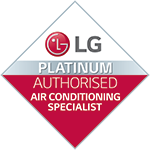At our company, we’ve never been fans of evaporative cooling. While we acknowledge that it’s better than no cooling at all, there’s simply no comparison when stacked against refrigerated cooling. Over the years, we’ve removed hundreds of evaporative systems but have never installed one. Let us explain why refrigerated cooling is the superior choice.
Running Cost Comparison
Is evaporative cooling cheaper to run? The answer isn’t straightforward.
-
On a warm day, evaporative systems can perform reasonably well, cycling on and off and potentially costing less to run than refrigerated cooling.
-
On mildly hot days, however, evaporative coolers must run continuously because the cooling effect stops as soon as the system turns off. In contrast, refrigerated systems remove heat energy from your home, allowing them to cycle on and off (or run at low speed with inverter technology) while maintaining a comfortable temperature.
-
In hot and humid conditions, evaporative cooling struggles. It runs at full capacity but often fails to provide relief when you need it most.
While evaporative cooling might seem cost-effective in some scenarios, its inability to perform in extreme conditions makes it a less reliable option.
How Evaporative Cooling Works
Heat is a form of energy, and energy cannot simply disappear. Evaporative and refrigerated cooling systems handle heat energy differently:
-
Evaporative Cooling: This system draws warm, dry air from outside and passes it through wet media. As water evaporates, it converts sensible heat into latent heat, lowering the air temperature but increasing humidity. Importantly, the heat energy isn’t removed—it’s just transformed. In fact, the system adds heat to the air through the fan motor, making it function more like a heater than a cooler.
-
Refrigerated Cooling: This system removes heat energy from the air, lowering both temperature and humidity. It’s far more effective at maintaining comfort, especially in humid conditions.
Relative Humidity and Your Comfort
Your body naturally regulates temperature through evaporative cooling—sweating helps you cool down. However, when evaporative cooling saturates the air with moisture, your body’s natural cooling mechanism becomes less effective, leaving you feeling sticky and uncomfortable.
Refrigerated cooling, on the other hand, reduces air temperature below the dew point, removing moisture and creating drier air. This allows your body to cool more efficiently, meaning you can set your system to a higher temperature while maintaining comfort and saving energy.
Hidden Costs of Evaporative Cooling
Evaporative cooling often comes with unexpected expenses:
-
Security and Noise Issues: To function properly, evaporative coolers require doors and windows to be open. This often necessitates the installation of security screens and flyscreens, adding $5,000 to your costs. Even then, noise from outside—whether it’s animals, traffic, or neighbours—can disrupt your sleep.
-
Moisture Problems: Evaporative cooling increases indoor humidity, leading to damp towels, slippery floors, and mould growth on ceilings and walls.
-
Ceiling Damage: High humidity can cause gyprock ceilings to sag or become wavy. Repairing this damage often requires replacing the entire ceiling, a costly and inconvenient process.
-
Heat Loss: Evaporative systems create significant heat loss through leaky ducts and vents. In colder months, this can increase heating costs by 10–20%, negating any savings from the system’s lower running costs.
Why Refrigerated Cooling is the Better Choice
Refrigerated cooling offers consistent, reliable performance in all conditions. It removes heat and moisture effectively, maintains indoor air quality, and avoids the hidden costs and drawbacks of evaporative systems.
While some people appreciate the “fresh air” feel of evaporative cooling, it’s worth noting that you can achieve a similar effect with refrigerated cooling by opening doors or windows—albeit with slightly reduced efficiency.
Our Recommendation
If you’re considering evaporative cooling, we strongly recommend exploring refrigerated cooling options instead. Not only will you enjoy superior comfort and energy efficiency, but you’ll also avoid the hidden costs and maintenance challenges associated with evaporative systems.
Ready to make the switch? Contact us today to discuss your cooling needs and find the perfect solution for your home.





